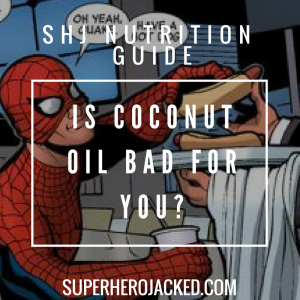Last updated on February 21st, 2023 at 06:37 am

Apparently, coconut oil isn’t all it’s cut out to be…
Unless you’ve been living under a rock, you’ve probably heard the recent news- or rather, near-tabloid-like frenzy- surrounding coconut oil.
A June 2017 report by the American Heart Association (AHA) came out with a presidential statement on saturated fat, proclaiming that,
“Taking into consideration the totality of the scientific evidence, satisfying rigorous criteria for causality, we conclude strongly that lowering intake of saturated fat and replacing it with unsaturated fats, especially polyunsaturated fats, will lower the incidence of CVD (cardiovascular disease).”
The full report goes on to vilify foods high in saturated fat, putting great emphasis on coconut oil in particular, by supporting their claim with the note that coconut oil was a richer source of saturated fat when compared to butter and beef fat (tallow) and other cooking oils.

Know the Source
While we settle down, let’s take a deep breath.
Something that’s very important to keep in mind here is finding out who’s backing up this study, and where their allegiances lie. After all, let’s not forget the scandalous sugar controversy from last year, when the sugar industry was caught manipulating heart studies.
After pulling up my investigative sleeves, here’s what I found:
It turns out that quite a lot of pharmaceutical companies– such as Pfizer, Glaxo-Smith Kine, and AstraZeneca- have given grants to the authors of this study. [1] Incidentally, these said companies also happen to produce cholesterol-lowering medications such as statins, as well as a new drug known as Repatha.
Next up, and perhaps the most egregious, are the funds coming from both the California Walnut Commission and the Canola Oil Council. As a quick refresher, the AHA report placed vegetable and seed oils in high regard, claiming that they helped to lower LDL cholesterol. (Anyone smelling something fishy here?)
What’s more, we should also remember that this is coming from the American Heart Association, a national VOLUNTEER agency who, in the past, has been known to issue problematic dietary guidelines for the public, like eating “low fat” processed foods high in sugar and preservatives. They’ve also recommended replacing a REAL food like 100%, full-fat butter for chemically laden margarine as a “heart healthy replacement”.
According to their Diet and Lifestyle Recommendations, fat is not very welcome when it comes to our diet.
Their recommendations include:
* Choosing “Fat-free (skim) and low-fat (1%) dairy products”
* Going for, “the leanest cuts available,” when it comes to meat (including skinless poultry and fish)
* Cutting out “non tropical oils”– i.e., NO COCONUT OIL. [2]
And in case you’re looking to yank every strand of hair off of your head until you’re bald from frustration, do you know who serves on the AHA’s “Industry Nutrition Advisory Panel”? Representatives from Nestle, Coca-Cola, The Sugar Association, the United Soybean Board, and the US Canola Association. Now take a look at this direct excerpt from the AHA’s website:
“The American Heart Association’s Industry Nutrition Advisory Panel (INAP) is a unique, strategic relationship between the American Heart Association’s Nutrition Committee and food industry leaders. In existence since 1995, INAP provides a platform for open dialogue, sharing of information and planning cooperative programs in areas of mutual interest such as diet and nutrition and cardiovascular disease.”
So before you take these findings as gospel, consider the source. And the source of the source. Follow the money, as they say.

Know the Data
Short Answer: The data that was reviewed had been cherry picked by the authors of the study, all of whom were paid by companies with vested interest.
Long Answer: The data in particular is not brand spanking new. It’s actually based off of four outdated studies that go back starting from 1968 to 1969, 1970, and 1979. All the researchers did was old data and parrot the AHA’s belligerent chastisement against saturated fat. (Which don’t even mention coconut oil.) It’s unlikely that the AHA is going to budge on their convictions; they haven’t stopped recommending to cut down on saturated fat since 1961. [3]
Here’s something else to keep in mind when it comes to interpreting any study- the subjects, especially when it comes to their species. The focused studies include testing on rodent and primate models for research. Humans metabolize fat differently than animals, so they may not wind up with the same outcomes as their non-human counterparts. Sure, some merit can be found with animal testing. They’re a good starting ground, but more research is warranted before any conclusions can be made. You need to graduate to humans, conduct more trials, run more tests, and compare healthier subjects to not-so-healthy ones. Otherwise, it’s just comparing apples to oranges.

Know the Claims
The only reason coconut oil is being ousted is because of its content of saturated fat; public enemy #1 for the AHA. And yet, according to a meta-analysis by the prestigious American Journal of Clinical Nutrition,
“…there is no significant evidence for concluding that dietary saturated fat is associated with an increased risk of CHD (coronary heart disease) and CVD (cardiovascular disease).” [4]
No matter the update, the AHA continues to turn a blind eye, and remain stuck in the past. There line of reasoning pertains to saturated fat raising cholesterol- specifically, LDL cholesterol. You know, the so-called “bad-kind”.
What if I told you there’s more to this story than meets the eye?
Here’s what you need to know.
There are two types of LDL cholesterol, each based on the size of their particles:
*Type A is big and “fluffy”, and actually good!
*Type B is small and “dense”, and inflammatory (aka, dangerous).
When looking at cholesterol, you need to take into consideration how much HDL cholesterol there is compared to LDL. HDL, aka ‘good’ cholesterol, cannot be ignored when looking at cholesterol as a whole.
According to Harvard Medical,
“The ratio of total cholesterol-to-HDL is important; the smaller the number the better. For example, someone with a total cholesterol of 200 and an HDL of 60 would have a ratio of 3.3 (200 ÷ 60 = 3.3). If that person’s HDL was low- let’s say 35- the total cholesterol-to-HDL ratio would be higher: 5.7.”
Strangely enough, the AHA’s report fails to consider whether the subjects from the four (outdated) studies even had good levels of either LDL or HDL.
It’s easy to think that the world is about to end if you look at a high LDL cholesterol number. The problem is, unless you know what type of cholesterol it is, or its particle size (if it is LDL), then you’re looking at an incomplete picture. Unless you get a full NMR Lipoprofile test, which not many doctors go out of their way to order and is not always covered by insurance, you’re going to be trapped in the dark.
But if you want to skim over cholesterol types, here’s a plot twist. People get heart attacks even when their cholesterol levels fall within “normal” range! [5]
The notion that saturated fat causes heart disease isn’t going to last unscathed and free of scrutiny. One significant 2014 study, published in the Mayo Clinic Proceedings, directly points an accusatory finger at the AHA, calling for a crucial change. According to the publication,
“For many years we have been told that to prevent cardiovascular disease (CVD), we must lower our intake of saturated faty acids (SFAs) and instead eat more carbohydrates and polyunsaturated fatty acids (PUFAs)….the medical profession has promoted this idea eagerly, although the number of contradictory scientific reports is almost endless. There is in fact much evidence that doing the opposite is more relevant.” [6]
It’s time for a wake-up call. Saturated fat AND coconut oil are not to blame here. We are looking in the wrong place when it comes to heart health.

There’s a Fire in Here
Here’s a quick look into inflammation, and why you should be aware of it when it comes to your health. This isn’t reserved only for those looking to overcome a chronic health issue, it affects every one, young and old. So if you’re looking to avoid the doctor’s office as much as possible, get superhero jacked and save the world, or live long enough to rocket to the moon, listen up.
Inflammation is a natural process within the body. It’s actually quite beneficial, under the circumstances. When you cut yourself accidentally or get stung by a bee, your body goes into defense mode and goes after any potential pathogens or foreign invaders in order to protect itself (you). The body also is seeking to remove any damaged cells or irritants that may prevent it from going into the next stage of healing and repair. You basically function like Wolverine, healing from wounds and getting back up almost as good as new.
(This is a good thing!)
Now, here’s where things can go very, very wrong.
What happens when your body can’t stop going after what it perceives to be a threat?
What if your body is constantly on attack-mode for as little as a few months to as long as several years?
That is what is known as chronic inflammation, when the body can’t recognize whether or not the “threat” has been eliminated. This can lead to autoimmunity, a condition in which the body is actually attacking itself, taking down healthy tissue that it thinks is causing harm.
So instead of functioning like Wolverine, your body turns into the Incredible Hulk, unable to distinguish friend from foe.
You do not want to fall within a state of chronic inflammation, as it could lead to autoimmune disease or inflammatory-related conditions, such as Crohn’s disease, Ulcerative Colitis, Chronic Hepatitis, Chronic Peptic Ulcers, Asthma, Rheumatoid Arthritis, Hashimoto’s Thyroiditis, Lupus, Type 1 Diabetes, Multiple Sclerosis (MS), and many others too numerous to name. But hopefully you get the gist of how diverse and consequential chronic inflammation can be!
One saying that’s oftentimes passed around natural health and functional medicine circles is “getting to the root cause”. Meaning, getting to the true instigator behind the problem. For example, if you’re getting stomach cramps, popping in an over-the-counter pill to cover up the symptom is just placing a band-aid over the real problem. In this example, the root cause behind the stomach cramp could be a food allergy, such as dairy, gluten, or soy. Once the aggregator has been removed and the cramping subsides, then you’ve found and eliminated your root cause.
In the context of heart disease, a possible (keyword: possible) root cause is inflammation. A publication in the British Journal of Sports Medicine elucidates on the association between coronary heart disease and chronic inflammation, and explores whether or not saturated fat clogs the arteries and causes heart disease. According to the publication, based on a “landmark systematic review and meta-analysis of observational studies”, there was no connection between the dietary intake of saturated fat and coronary heart disease or coronary-related mortality (death), all-cause mortality, ischaemic strokes (when the arteries in the brain become blocked), and Type-2 diabetes (which is non-insulin-dependent diabetes; sometimes referred to as adult-onset diabetes, although children and young adults can get it as well). In fact, as a preventative measure against the development or risk of cardiovascular disease, it was found that neither fat or saturated fat reductions in the diet had any benefit.

BONUS:
The BJSM publication also noted that in an angiographic study (based on x-rays of blood vessels) of postmenopausal women with coronary heart disease, higher intakes of saturated fat were associated with a lessened progression of atherosclerosis, which is the hardening and narrowing of the arteries due to a build up of plaque. Atherosclerosis is a serious occurrence that must be dealt with immediately, as it cuts off circulation to the heart, leading to a risk of developing a heart attack, stroke, or worse, death. On the flip-side, the angiographic study also found that both carbohydrates and polyunsaturated fat intake were associated with a heightened progression of developing atherosclerosis.
Polyunsaturated fats are found naturally in both animals and plant foods, from salmon to nuts and seeds.However, a third category of alleged foods that contain polyunsaturated fats includes vegetable oils: Canola, corn, soy, cottonseed, peanut, sunflower, safflower. Vegetable oils, as mentioned before, are highly processed, low-quality, unstable, and, wouldn’t you know it, pro-inflammatory. So, by regularly ingesting vegetable oils, you’re depriving the body of receiving nutrition from a pure whole food, and are instead ingesting an inferior oil that could potentially increase your risk of developing cardiovascular disease and any other inflammatory-related condition.
Coincidentally, the AHA seems to have no objections to vegetable oils which, unlike coconut oil, are highly unstable, unclean agents of inflammation. Many of which come from processed GMO seeds and contain pesticides and herbicides like glyphosate that can cause some serious damage when consumed in excess. In a seriously sick twist of irony, it’s actually been shown that replacing saturated fats with vegetable oils like corn oils actually increases the risk of developing coronary heart disease, and increasing the risk of death by up to 22%. [7] The plot thickens, no?
The following studies also have been shown to associate the link between inflammation and cardiovascular risk:
* “High-sensitivity C-reactive protein as cardiovascular risk marker in patients with diabetes mellitus.” https://www.ncbi.nlm.nih.gov/pubmed/16472048
* “Inflammatory cytokines and risk of coronary heart disease: new prospective study and updated meta-analysis.” https://www.ncbi.nlm.nih.gov/pubmed/24026779
* Systemic inflammation as a cardiovascular disease risk factor and as potential target for drug therapy.” https://www.ncbi.nlm.nih.gov/pubmed/11975814
As of note, all of these studies conclude with a sound need for further exploration into inflammation and cardiovascular disease risk. They by no means automatically proclaim that inflammation is the direct cause for heart disease, but simply open up the conversation to possible link, and urge more exploration into the root causes behind heart disease. More so, they stand to show that saturated fat isn’t necessarily the direct cause either, nor is it worthy of the condemnation that associations like the American Heart Association have made it out to be.

Putting Everything Together
1) The latest coconut oil scandal was made by the American Heart Association, a volunteer organization with ties to the pharmaceutical companies producing cholesterol-lowering medications and statins, and representatives behind the production of vegetable oils like canola oil and sugar.
2) The AHA also has a questionable record of approving processed foods containing junk ingredients and sugar, which serve no nutritional benefit to the body.
3) The report itself carries on the findings of outdated studies based on animal models. Moreover, the studies do not take into account the type of cholesterol found in their data, such as HDL ratios and LDL particle size.
In conclusion, the latest report by the American Heart Association provides a small number of flawed studies in order to imply that coconut oil as well as other foods high in saturated fat as causal factors behind cardiovascular disease.

So What Can YOU Do?
Simply put, pay attention to your body.
If you perform and feel well on a diet that is low in fat, then do so. And vice versa. But you can sleep well knowing that you don’t have to abandon your coconut oil taste buds or fear even consuming a drop of it in your food. It’s not dangerous, and it won’t kill you.
Talk to your doctor if you’re truly concerned or if you have a legitimate medical issue that warrants an investigation into your diet. Only then can you and your doctor determine whether or not coconut oil is a hindrance to your health. Otherwise, again, there’s no need to panic. Just use some common sense.
Don’t binge out on coconut oil by inhaling the contents of an entire jar in one sitting.
But don’t be afraid to have two tablespoons in a cup of Bulletproof Coffee, if that meets your fancy. (There’s a great recipe for Mike’s take on it, which we call Superhuman Fuel. Why not make yourself a cup once you’re done reading this post?) You can also apply a tablespoon or two into other meals, too, such as a stir-fry, eggs (any style, whether it’s an omelette or scramble), sauteed vegetables, soups, or even a smoothie! (Yes, I’m the weirdo who does this!)
That being said, please remember to include other sources of dietary fat into your diet as well, such as avocado, olive oil, nuts and seeds, and eggs, animal meats, and dairy, if you’re not vegan. Diversity is key here, too.
To keep the superhero theme going, think of your diet like a line-up of heroes on a team, such as the Justice League, the Avengers, Guardians of the Galaxy, Defenders, or Power Rangers. By itself, coconut oil is great! But what happens when you include it with other foods as well? You’ll still benefit from the coconut oil, but it can’t perform like a handful of almonds can (monounsaturated and polyunsaturated fat and fiber), or a fillet of salmon (anti-inflammatory omega-3 fatty acids and complete, bio-available- easy to absorb- protein). Hopefully you’ll see now that coconut oil is a winning player on your personalized team!
At the end of the day, I sincerely hope this helps you to make some sense of the coconut oil madness that continues to go on!
With any scandalous, or sensationalized story, there’s a line of truth to be found. It’s easy to take words for face value, and not decide for ourselves what’s real and what’s not. In this case, it takes a lot of careful digging and exploration in order to truly find out what was going on behind-the-scenes.
Once you learn how to do this though, you’ll actually start to become immune to the flip-flopping, indecisiveness of the media when it comes to nutrition and diet. One minute, fat is where it’s at, and the next, it’s public enemy #1.
Learn to read the research, find the source behind it, and do your best to make sense of the science or at the very least rely upon a variety of well-knowledgeable sources that can do all of the above and then some when it comes to understanding these outbreaks. We may not be scientists, but we’re not foolish enough to take these stories for granted.
Fight on my friends!
#####
Sam
SHJ’s Newest Contributor
AKA, The Dragon
Join The Superhero Academy and start unleashing your inner SuperHuman.
Sources:
[1] http://observer.com/2017/06/new-study-coconut-oil-ldl-cholesterol-levels/
[2] http://www.heart.org/HEARTORG/HealthyLiving/HealthyEating/Nutrition/Diet-and-Lifestyle-Recommendations_UCM_305855_Article.jsp#.WW6GaSg0_Hi
[3] https://jamanetwork.com/journals/jama/article-abstract/330357
[4] http://ajcn.nutrition.org/content/early/2010/01/13/ajcn.2009.27725.abstract
[5] Lipid Levels In Patients Hospitalized With Coronary Artery Disease: An Analysis Of 136,905 Hospitalizations In Get With The Guidelines.
[6] http://www.mayoclinicproceedings.org/article/S0025-6196(13)01004-5/abstract
[7] http://www.bmj.com/content/353/bmj.i1246

SUPERHUMAN SECRETS V.2
NOW UPDATED AND EXPANDED WITH A NEW SECTION & SEVEN BONUSES
USD$29 USD$14.95


